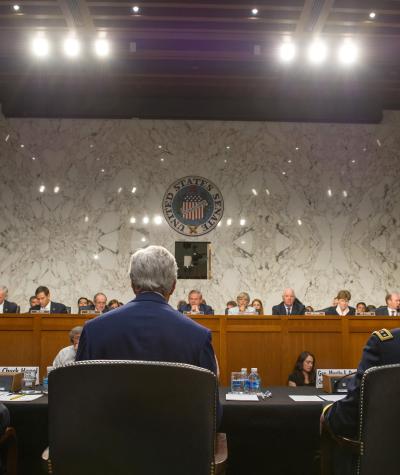(This article is Part 2 of a three-part series examining the failed effort to enforce ethics in the U.S. Senate. See Part 1 here and Part 3 here.)
The Office of Congressional Ethics (OCE) serves a vital role in democracy by providing independent, nonpartisan oversight that safeguards the U.S. House of Representatives against corruption and holds members accountable for ethics violations.
However, the OCE’s creation was hard-fought — it was born following a string of ethics violations that occurred in quick succession.
Between 2005 and 2006, the House was embroiled in more ethics scandals than it had faced in nearly 30 years. These scandals began with Rep. Randy “Duke” Cunningham (R-CA) resigning after he pleaded guilty to accepting nearly $2.5 million in bribes from defense contractors in November 2005.
Less than five months later, former Majority Leader Tom Delay (R-TX) left office after being indicted on campaign finance charges. The next month, Rep. William Jefferson’s (D-LA) office was raided by the FBI as part of a federal bribery investigation into the representative.
The final scandal, the infamous saga surrounding lobbyist Jack Abramoff, was the straw that broke the camel’s back. That scandal, which saw Abramoff and other lobbyists engaging in illegal lobbying-related activities, implicated Rep. Bob Ney (R-OH) and two aides to Delay.
Ney pleaded guilty to conspiracy and making false statements as part of the scandal and eventually resigned in October 2006.
In January 2007, at the start of the new Congress, then-Speaker of the House Nancy Pelosi (D-CA) and Minority Leader John Boehner (R-OH) announced the creation of the Special Task Force on Ethics Enforcement.
This task force considered whether the House should have an outside enforcement entity. After 11 months, 29 executive sessions, and a public hearing, it issued its final report.
The report recommended that the House create the OCE as an independent office within the House tasked with reviewing allegations of misconduct and making recommendations to the House Ethics Committee.
In coordination with the report’s release, the task force chair, Rep. Mike Capuano (D-MA), introduced House Resolution 895, which officially created the OCE. This resolution passed on March 11, 2008, and the OCE held its first public meeting on January 23, 2009.
The scandals that plagued the House in the 109th Congress made it abundantly clear that the status quo could not stand. The public viewed the House as tainted, and the only way to rebuild public trust was for Congress to show that it takes ethics enforcement seriously.
The OCE has been a marked success, operating effectively and efficiently as a nonpartisan office over the last 15 years, making House ethics enforcement more transparent.
The recent indictment of Sen. Robert Menendez (D-NJ), which has not resulted in a Senate Ethics Committee investigation, along with other uninvestigated ethics scandals over the past several years show that the self-policing of the Senate is not effective.
The serious allegations of misconduct that have lingered without a transparent fact-finding process include allegations of insider trading, undisclosed stock trades, illegal gifts, illegal staff payments, and official acts performed in connection with campaign contributions.
History suggests that it is time for the Senate to create an independent ethics office similar to the OCE.
(The benefits of establishing an independent Senate ethics enforcement office are discussed in Part 3.)

